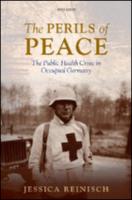The Perils of Peace
The Public Health Crisis in Occupied Germany
Author(s)
Reinisch, Jessica
Collection
WellcomeLanguage
EnglishAbstract
When the war was over in 1945, Germany was a country with no government, little functioning infrastructure, millions of refugees and homeless people, and huge foreign armies living largely off the land. Large parts of the country were covered in rubble, with no clean drinking water, electricity, or gas. Hospitals overflowed with patients, but were short of beds, medicines, and medical personnel. In these conditions, the potential for epidemics and public health disasters was severe. This is a study of how the four occupiers—Britain, France, the Soviet Union, and the United States—attempted to keep their own troops and the ex-enemy population alive. While the war was still being fought, German public health was a secondary consideration for them, an unaffordable and undeserved luxury. But once fighting ceased and the occupation began, it rapidly turned into a urgent priority. Public health was now recognized as an indispensable component of creating order, keeping the population governable, and facilitating the reconstruction of German society. But they faced a number of insoluble problems in the process: Which Germans could be trusted to work with the occupiers, and how were they to be identified? Who could be tolerated because of a lack of alternatives? How, if at all, could former Nazis be reformed and reintegrated into German society? What was the purpose of the occupation anyway? This is the first carefully researched comparison of the four occupation zones which looks at the occupation through the prism of public health, an essential service fundamentally shaped by political and economic criteria, and which in turn was to determine the success or failure of the occupation.
Keywords
post-war germany; public health; world war ii; Allied-occupied Germany; Berlin; Creative Commons license; Denazification; Nazism; Soviet UnionDOI
10.1093/acprof:oso/9780199660797.001.0001Publisher
Oxford University PressPublisher website
https://global.oup.com/Publication date and place
Oxford, 2013Grantor
Classification
European history
History and Archaeology
Later 20th century c 1950 to c 1999
Second World War
Modern warfare
c 1938 to c 1946 (World War Two period)
History of medicine
Pages
337Chapters in this book
- Chapter Allies and Germans
- Chapter Acknowledgements
- Chapter Introduction
- Chapter 3 can we distinguish the sheep from the wolves? : AmigrÃs, Allies, and the Reconstruction of Germany
- Chapter 6 Public Health Work in the American Occupation Zone
- Chapter 9 Some Conclusions
- Chapter 4 'Now, back to our Virchow': German Medical and Political Traditions in Post-war Berlin
- Chapter Abbreviations
- Chapter 5 Public Health Work in the British Occupation Zone
- Chapter Bibliography
- Chapter 2 A Hard Peace? Allied Preparations for the Occupation of Germany, 1943-1945
- Chapter 8 The Forgotten Zone: Public Health Work in the French Occupation Zone
- Chapter Compromises and Confrontations, 1945-1949
- Chapter 7 Public Health Work in the Soviet Occupation Zone


 Download
Download Web Shop
Web Shop